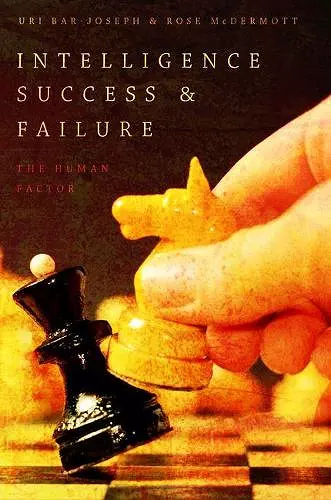Intelligence Success and Failure
The Human Factor
Uri Bar-Joseph author Rose McDermott author
Format:Hardback
Publisher:Oxford University Press Inc
Published:20th Apr '17
Currently unavailable, and unfortunately no date known when it will be back
This hardback is available in another edition too:
- Paperback£33.99(9780199341740)

The study of strategic surprise has long concentrated on important failures that resulted in catastrophes such as Pearl Harbor and the September 11th attacks, and the majority of previously published research in the field determines that such large-scale military failures often stem from defective information-processing systems. Intelligence Success and Failure challenges this common assertion that catastrophic surprise attacks are the unmistakable products of warning failure alone. Further, Uri Bar-Joseph and Rose McDermott approach this topic uniquely by highlighting the successful cases of strategic surprise, as well as the failures, from a psychological perspective. This book delineates the critical role of individual psychopathologies in precipitating failure by investigating important historical cases. Bar-Joseph and McDermott use six particular military attacks as examples for their analysis, including: "Barbarossa," the June 1941 German invasion of the USSR (failure); the fall-winter 1941 battle for Moscow (success); the Arab attack on Israel on Yom Kippur 1973 (failure); and the second Egyptian offensive in the war six days later (success). From these specific cases and others, they analyze the psychological mechanisms through which leaders assess their own fatal mistakes and use the intelligence available to them. Their research examines the factors that contribute to failure and success in responding to strategic surprise and identify the learning process that central decision makers use to facilitate subsequent successes. Intelligence Success and Failure presents a new theory in the study of strategic surprise that claims the key explanation for warning failure is not unintentional action, but rather, motivated biases in key intelligence and central leaders that null any sense of doubt prior to surprise attacks.
Bar-Joseph and McDermott develop a theoretical framework related to the human factor in explaining success and failure in three wars: the German invasion of the Soviet Union in 1941; the Korean War in 1950; and the Arab attack on Israel in 1973... Recommended. * S. L. Rozman (Tougaloo College), Choice Reviews Vol 55. *
ISBN: 9780199341733
Dimensions: 160mm x 239mm x 23mm
Weight: 556g
280 pages